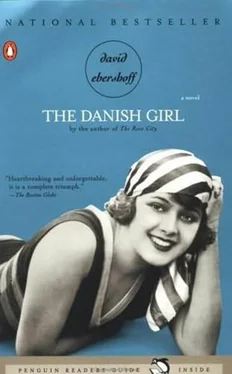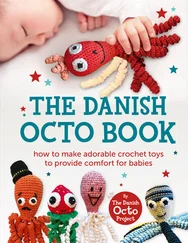But Greta couldn’t take Einar to Dresden. At least not yet. There were many reasons, including the private exhibition of her latest paintings, all of which showed Lili lying on a table, her hands folded over her stomach, her eyes sealed as if dead. The paintings, which were small, the size of a good dictionary, hung in the parquet foyer of a countess who lived within calling distance of not only the best atelier in Paris, but also the best apothecary, who knew everything about masks of Normandy mud and female rinses mixed of lime juice and the Pure Pasadena Extract Greta gave him in exchange for the cosmetic appliances like the Derma clean machine that Lili required more and more.
The paintings-there were only eight-sold in an afternoon, to people whose chauffeurs were waiting in the open doors of Nürburg convertible limousines on the street below, the burl-walnut paneling reflecting the early-autumn sun. Hans had arranged the show, which he told more than one newspaper editor was the first must-see of la rentrée. He was wearing an opal pin in his suit’s lapel. He squeezed Greta’s hand when each painting was pulled from the countess’s walls, which were trimmed with a picture-frame molding clogged with a century of paint. And Greta, despite the continuous accumulation of her fortune in the main branch of Landmandsbanken, found her eyes glazing over as she watched the leather hoods of checkbooks open and the pens scratch through the carbon paper.
That was one reason she could not take Einar to Dresden right away. A second reason was Carlisle, who was contemplating staying in Paris through Christmas. If she knew anything, she knew Carlisle was quite like herself in at least one way: his impulse to take on a project with an obsessive need to reach a solution. There had never been a painting Greta hadn’t finished. True, even she could now admit, many-especially during her early years in Denmark-had never been any good. Oh, if she could only return to Copenhagen on the blackest night and pull from the walls of all those offices along Vesterbrogade and Nørre Farimagsgade the drably official paintings she had produced when she was so young, so unsure of what she wanted to, or could, achieve! She thought of a severe portrait of Herr I. Glückstadt, the financier behind the East Asiatic Company and the Copenhagen Free Harbor; she had applied straight silver paint to reproduce his cap of hair; and his right hand, clutching a pen, was no more than a square, a blurry block, of flesh-colored paint.
And Greta knew that she and Carlisle shared this same need to continue working; inside their nearly identical-sized bodies hung an urge to achieve. One day, Carlisle had returned to the casita with a burst of news that had forced Greta to rest her brush in the cup of turpentine and sit on the daybed.
“Einar and I have met with some doctors,” he began. Driving around in his convertible had given Carlisle some color, and his face was even more handsome than Greta had recalled. When she closed her eyes and listened to her brother’s voice, which was flat and precise, she nearly thought she was listening to a recording of herself.
Carlisle described the visits, the futility of them, the humiliation Einar had endured. “He can bear more than most men,” Carlisle was saying, and Greta thought to herself, Yes, I already know.
“But there is one doctor,” Carlisle continued. “Dr. Buson. He thinks he can help him. He’s dealt with this before. With people who think they’re-” And here Carlisle’s voice cracked, something which Greta’s never did. “Who think they’re more than one person.”
Carlisle explained the lobotomy, the sharp little drills that Dr. Buson had set out on the cart with casters. He had made it sound no more complicated than swatting a fly.
“I think it’s what Einar wants to do,” Carlisle said.
“That’s too bad, because I’ve found a doctor myself,” Greta interrupted. She had pressed coffee grounds through a cylinder of steaming water, and now she was pouring it. When she went to look, there was no cream in the kitchen, and something inside her welled up-as if she were a little girl in the mansion in Pasadena and one of the Japanese maids had failed to set out the promised dish of candied dates-and she had to keep herself from stomping her foot. Even Greta hated it when she became petty, but sometimes she couldn’t help herself.
“He thinks he can help Einar change,” she continued. She apologized for not having any cream; she thought of saying, “I suppose I’m no good at managing both the house and my work, even if I like to think I am,” but decided it would sound insincere, or ungrateful, or something-oh, she didn’t know what-and now she became hot beneath her long skirt and the blouse that was tight in the sleeves, and she wondered why she was discussing her husband with her brother, why Carlisle should have any say at all.
But she stopped herself.
“But Dr. Buson thinks he can help Einar change,” Carlisle said. “Is your doctor proposing the same thing? Did he say anything about the drills through the forehead?”
“Professor Bolk thinks he can change Einar into a woman,” Greta said. “Not mentally, but physically.”
“But how?”
“Through surgery,” Greta said. “There are three surgeries that the professor wants to try.”
“I don’t think I understand.”
“Trust me.”
“Of course I trust you. But what kind of surgery?”
“Transforming surgery.”
“Have you told Einar?” Carlisle asked.
“Not yet,” she said.
“It sounds terribly risky.”
“No more than what you’re proposing.”
Carlisle was on the velvet ottoman, his leg up. She liked having him stay with them, to fill the morning hours while Lili slept, to stay with Greta when Lili set out on errands and a bathe. She supposed in some ways she had silently asked for his help. “I’m not going to let him go see Buson,” she said. “He could come back a child, an infant practically.”
“It has to be Einar’s decision,” Carlisle said. “He’s an adult, he’ll have to decide.” Always the reasonable one, her brother. Sometimes too pragmatic for Greta.
Greta sipped her coffee; how she hated black coffee! She said, “It’s up to Einar.” And then, “Of course.”
And that was another reason why Greta couldn’t take Einar to Dresden just yet. She would have to find the day, when she was free and Einar was happy because Lili had visited recently and her stay hadn’t been painful but joyous: with a victorious game of badminton on the lawn behind Anna’s apartment, or an evening of cinema at the Gaumont-Palace; after a day like this was when Greta could explain to Einar his options for what to do next with Lili. It wouldn’t be easy. Greta imagined Carlisle had done a fine job convincing Einar about Dr. Buson’s skill, about the potential of the lobotomy, which to her sounded both gruesome and cruel. She would never let Einar go through with something like that. But Carlisle was right about one thing: Einar would have to decide for himself. Greta would have to make him believe, as she did, that Bolk could solve their problem, the problem that had both defined and ruined their marriage, more resolutely than any other man in the world. Bolk had already returned to Dresden, and so she would have to convince Einar on her own: take his hand in hers, push her hair over her ears, and explain the promise, the glittering promise, that lay in Dresden.
And yet there was one more reason why Greta hesitated taking Einar to Dresden.
By March of 1918 the winter rains had ended, and Pasadena was green, as green as the jade Buddha Akiko kept in her dormer room on the third floor of the Waud mansion. Greta and Teddy had buried baby Carlisle in the Bakersfield strawberry fields and resettled in Pasadena, saddened and, as Mrs. Waud stressed by the way she anxiously played with her rings, a bit scarred.
Читать дальше












